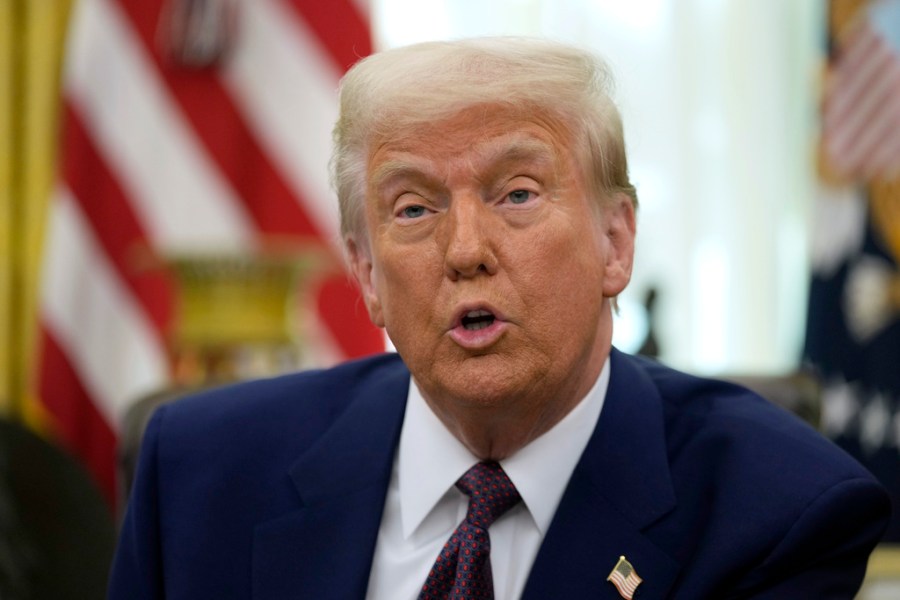
President Trump’s executive order calling for creating a U.S. sovereign wealth fund (SWF) is a shiny object looking for a useful function. The idea that Washington should set up an investment fund when it can’t even manage its own budget is laughable at best and dangerous at worst.
Unlike some other countries with successful SWFs that the president seems to admire — such as Norway, Singapore and the Gulf states — the United States does not have surplus revenue to invest. Instead, it is drowning in debt, with an estimated $80 trillion in net-present-value unfunded obligations.
The fundamental flaw in this proposal is that a U.S. SWF would not generate new wealth; it would merely redirect capital from the private sector to the government. Given the government’s fiscal position, this fund would ultimately rely on government debt to make investments. This is true even if it relied on a dedicated funding stream, such as tariffs or revenues from natural resources or asset sales. The government’s net negative position wouldn’t change.
To generate capital for the fund, some proponents suggest “monetizing the asset side of the U.S. balance sheet” — a vague phrase that likely means selling or leasing federal assets, such as public lands or infrastructure. But even if this were feasible, why should the government be in the business of managing investment portfolios when private capital markets already allocate resources far more efficiently? Instead, Congress should use any proceeds from federal assets to reduce out-of-control deficits and debt and lock in lower taxes for Americans.
Even if the fund were to outperform the government’s borrowing costs, it would simply be a transfer of economic activity, not an actual increase in national prosperity. Worse, it would invite political interference in capital markets, opening the door to cronyism, favoritism and inefficiency. Given Washington’s track record, does anyone believe that a government-run investment fund would be free from political meddling?
Look no further than the U.S. International Development Finance Corporation (DFC) for a preview of how misguided an American SWF could be. This agency, a rebranded and expanded version of the former Overseas Private Investment Corporation (OPIC), was created under the Trump administration to finance private sector projects in developing countries. Its mission? To promote U.S. economic interests and support global development. To accomplish this goal, it socializes investment risk, using taxpayer-backed loan guarantees to support investments that might otherwise struggle to secure financing in the market.
U.S. officials justify the DFC by claiming it promotes economic development and supports U.S. foreign policy objectives. Yet, in practice, it relieves foreign governments of the need to implement reforms that would attract investment on their own. Instead of securing property rights, enforcing contracts and adopting sound economic policies, recipient countries can rely on Washington-backed schemes to prop up their investments.
A U.S. sovereign wealth fund could fall into the same trap — allocating capital based on political priorities rather than economic merit.
Furthermore, an SWF would create dangerous incentives for government intervention in the economy. Would a government-controlled fund invest in politically favored industries like green energy or biotech while avoiding sectors deemed “unacceptable” by the administration in power? Would it use its influence as a shareholder to push political agendas on corporate America? These risks are not hypothetical; they are the natural consequences of state-managed investment.
If anything, the administration should be looking to eliminate the Development Finance Corporation, not replicate it on a grander scale. Rather than shielding foreign governments from the need to create attractive investment environments, the U.S. should encourage market-driven reforms that empower local economies to flourish without Washington’s artificial support.
The same logic applies domestically: If the U.S. wants a thriving economy, it should reduce deficits, cut wasteful spending and create a stable economic environment for private investment — not launch a new bureaucratic experiment in government-run asset management.
A U.S. sovereign wealth fund is not just a bad idea; it is an illusion. America’s strength lies in its dynamic private sector, not government-managed wealth schemes. The administration should focus on fixing its balance sheet, not pretending to be a hedge fund.
Romina Boccia is director of budget and entitlement policy at the Cato Institute.












